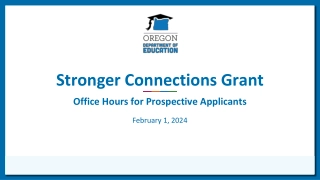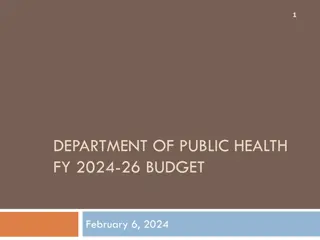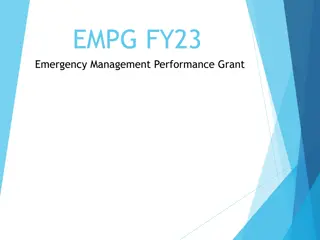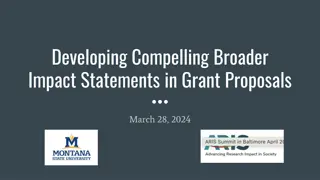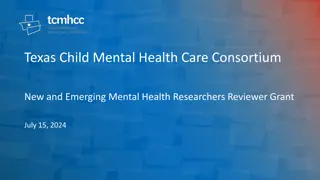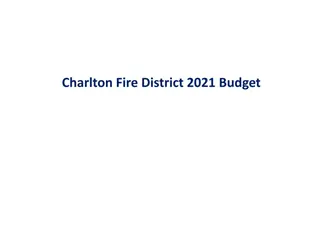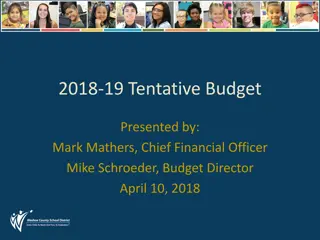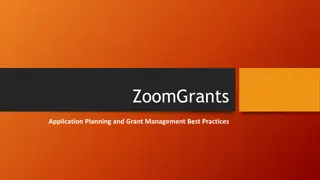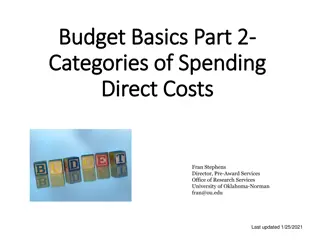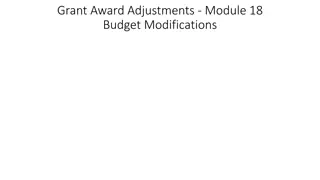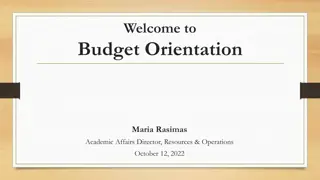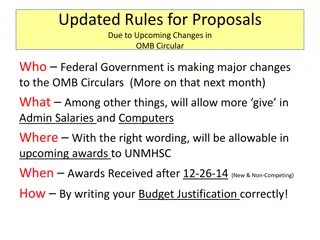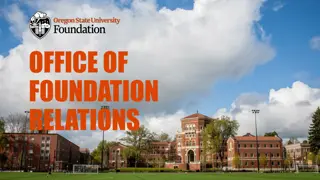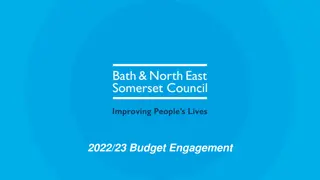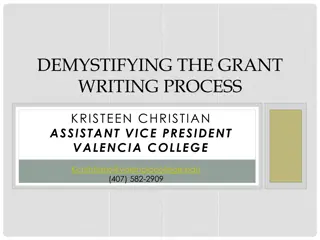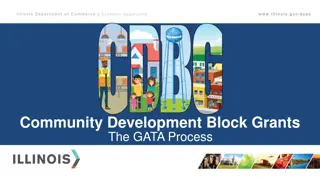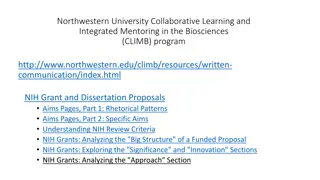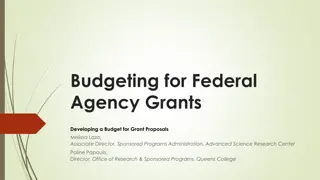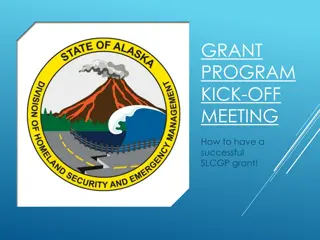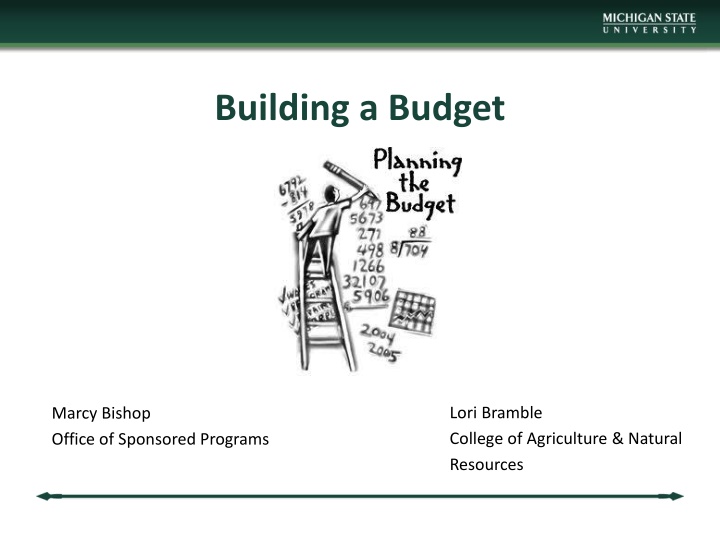
Building a Budget for Successful Grant Proposals
This presentation covers important aspects of building a budget for successful grant proposals, including why budgets matter, budgeting tips, necessary resources and tools, guiding principles, pre-award office support, and budget development resources for Kuali Coeus. It details key steps and considerations in preparing budgets, emphasizing the principles guiding budget development, federal cost principles, and effective communication with project personnel and subawardees. The session outlines objectives aimed at developing an accurate and acceptable budget for grant applications.
Download Presentation

Please find below an Image/Link to download the presentation.
The content on the website is provided AS IS for your information and personal use only. It may not be sold, licensed, or shared on other websites without obtaining consent from the author. If you encounter any issues during the download, it is possible that the publisher has removed the file from their server.
You are allowed to download the files provided on this website for personal or commercial use, subject to the condition that they are used lawfully. All files are the property of their respective owners.
The content on the website is provided AS IS for your information and personal use only. It may not be sold, licensed, or shared on other websites without obtaining consent from the author.
E N D
Presentation Transcript
Building a Budget Lori Bramble College of Agriculture & Natural Resources Marcy Bishop Office of Sponsored Programs
Todays Agenda Introduction PowerPoint link: https://vprgs.msu.edu/presentations Why do budgets matter? Budgeting tips Resources and tools needed to prepare a budget
Session Objectives Develop an understanding of the role of the budget Understand the principles that guide the development of acceptable budgets Obtain the tools to develop accurate budgets
Guiding Principles 2 CFR Part 215: Uniform Administrative Requirements for Grants and Agreements with Institutions of Higher Education Federal cost principles provide that costs charged to a federal grant or contract must be: Allowable Reasonable Allocable https://www.gpo.gov/fdsys/granule/CFR-2012-title2-vol1/CFR-2012-title2- vol1-part215/content-detail.html
Pre-award Office Support Notify your contact as soon as you decide to work on the proposal (as early as possible) Send the solicitation to your contact and also read it yourself Let your contact know Project dates and title names of all project personnel who are the PIs and co-investigators? Is it collaborative? Who is the lead? Are there subawards? With whom? Budget limits?
Pre-award Office Support Set deadlines for personnel documents Biosketches, Current & Pending Support, Letters of Support, etc. Set deadlines for your Subawardees Remember it takes time for them to get their documents ready and approved This will allow time for corrections or requests for more information. COMMUNICATION!!!
Budget Development Resources for Kuali Coeus (KC) User Education Materials https://www.osp.msu.edu/PL/Portal/DocumentViewer.as px?cga=aQBkAD0ANwA4ADcA If you do not have pre-award support, learn how to use Kuali Coeus to find salaries and fringe benefits for current MSU employees and for To Be Named personnel.
Budgeting Tips Look for requirements in your solicitation Project dates restrictions Budget caps Limits to F&A Required travel for PI meeting Required cost share (match) Justification details Subaward budget details Specific budget form AOR letter or letter of support
Why is the budget relevant to you? The budget helps to guide your scope of work. If your budget is too low for the amount of work you are proposing, your proposal may be too ambitious for the funding available. If your budget is too high, then your funding request may be perceived as unreasonable.
Typical Budget Categories Personnel Non-Personnel Equipment Travel Other Direct Costs Supplies Publication Costs Consultant Services Subawards Graduate tuition & fees Animal costs Indirect Costs/F&A
KC Budget Creating a PD Document (PD = Proposal Development) Log into EBS with two factor authentication: www.ebs.msu.edu Click on Create Proposal Complete 7 fields to save proposal development document After you save the proposal development document, write down the PD Number from the Description field for future reference. This can be your inquiry proposal to calculate salary and fringe benefits when needed.
KC Budget Click on the budget versions tab. Enter a name for your budget (example Luyendyk salary) and click add Click open to access the budget tools.
KC Budget Adding Personnel Click on Personnel tab Click on Employee Search and type in last name in Last Name field and click search Click box next to desired results and click on return selected, then click on save at the bottom of the screen. Select person s name under Personnel Detail tab, *Person. Then select an Object Code Name, such as Faculty (Salaries and Wages) for academic year time. Click on add. Enter 100% in the Effort field and 100% in the Charged field. This will give you the base salary and total fringe benefits
KC Budget Adding TBN Personnel Click on Personnel tab Click on To be named and then click search You will have a number of positions to choose from. Research associate is for a post doc. Click box next to desired results and click on return selected, then click on save at the bottom of the screen. Enter a salary in the *Base Salary field for the research associate then save at the bottom of the screen. Select Research Associate under Personnel Detail tab, *Person. Then select an Object Code Name, such as Research Associate (0-36 months). Click add. Enter 100% in the Effort field and 100% in the Charged field. This will give you the base salary and total fringe benefits
KC Budget Tools TBN Personnel HR Resources technical support staff: Job Classification Search: https://jobclassifications.hr.msu.edu/application/jobClassif icationSearch.jsf Salary Ranges: https://www.hr.msu.edu/ua/recognition/support- staff/pay-ranges.html
KC Budget Tools TBN Personnel Resources Post Docs/Graduate students: Post Docs: NIH NRSA Suggested Stipend Levels: https://grants.nih.gov/grants/guide/notice-files/not-od-17-003.html Graduate student stipend ranges: https://www.hr.msu.edu/employment/graduate-assistants/stipend- ranges.html Graduate student tuition and health costs: https://www.cga.msu.edu/PL/Portal/DocumentViewer.aspx?cga=aQBkAD0A MwA4ADIA Scroll down to Fringe Benefits, then proceed to link to Grad Summary Chart (pdf) near the bottom of the page.
KC Budget Non-Personnel Equipment: Federal Cost Principle Equipment is an item costing at least $5,000 with a useful life of more than one year. F&A (indirect costs) is not charged on equipment. Items that cost less than $5,000 are not considered equipment, and belong in the supplies category of the budget.
KC Budget Non-Personnel Travel (Domestic): Look for required travel in the RFA Be as detailed as possible in the budget justification Airfare, per diem, lodging, car rental, mileage, railway, taxi, etc. Number of people to what meetings Demo of MSU Travel Website http://www.ctlr.msu.edu/cotravel/
KC Budget Non-Personnel Travel (International): Budget foreign travel using U.S. air carrier rates consider unique costs vaccines/immunizations, visa costs, in-country consultant Be as detailed as possible in the budget justification Airfare, per diem, lodging, car rental, mileage, railway, taxi, etc. OSP International Budget Preparation Considerations https://www.cga.msu.edu/PL/Portal/DocumentViewer.aspx?cga=aQBkAD0AN AAxADcA#int-travel Additional Information and Tools for International Projects: https://cga.msu.edu/PL/Portal/DocumentViewer.aspx?cga=aQBkAD0ANAAyA DEA
KC Budget - Other Direct Costs Materials and Supplies: Project-specific supplies Laboratory supplies (chemicals, beakers, etc.) Diagnostic sampling kits or tests Supplies that are typically unallowable and require additional justification: Computers Toner, paper, pens and pencils, general office supplies Food, meals
KC Budget - Other Direct Costs Professional Services/Consultant: Typically MSU employees are not allowed to be consultants Specify an hourly rate of pay and number of days of expected service to the project Can include travel, lodging, meals Consultants are usually paid individually and not through institutional salary
KC Budget - Other Direct Costs Publications/Documentation/Dissemination: Publishing costs for journals Can also include preparing and publishing reports Storage and indexing of data and databases Storage and preservation of physical specimens Graduate tuition & fees: Grad Tuition Chart link on slide 16
KC Budget Other Direct Costs Subawards: Subawards include and fund collaborators from other institutions The subaward budget usually includes direct costs such as salary, travel, and supplies, and F&A (indirect costs). Budget requirements from the solicitation or sponsor also apply to subawardees. Please be aware of required documentation for subawards. Budget, Justification, Subrecipient Commitment Form, Letter signed by AOR
KC Budget F&A Direct vs. F&A (indirect costs) Direct Costs Specifically identifiable to your project Ex. Salaries, fringe benefits, tuition remission, consultants, equipment, supplies and materials, travel, and subawards F&A Costs NOT specifically identifiable to your project Ex. Buildings, utilities, administrative support (OSP) Check your solicitation for the amount that should be charged to your project.
MSUs Federally Negotiated Indirect Cost Rate Our federally negotiated rate uses the MTDC base, which excludes grad tuition and fees, equipment, participant support cost, subcontract payments over $25k, and other costs. If your project is more than 50% off campus, you should use the 26% off campus rate. Subawards are not included in this determination.
KC Budget - Cost Sharing Cost sharing is that portion of the project costs that are paid from sources other than the sponsor. Include only when required Many federal agencies that previously required cost sharing have reduced or eliminated the requirement and instead are basing their funding decisions on the technical merits of the proposal. Mandatory vs. Voluntary Mandatory cost share is a requirement of the solicitation. Voluntary cost share is NOT a requirement of the solicitation, but is a quantifiable amount identified in the proposal that we are not requesting the sponsor to pay for.
KC Budget - Cost Sharing Cost sharing requires approval from the source of funding prior to submission. need a confirmation letter or documentation from source Add the voluntary cost share $ amount to the custom data tab There is a box to enter total cost share amount
The Budget Justification Will highlight, explain, and provide rationale for each budget category entry, and how the PI arrived at certain cost estimates Used to justify the expenses included in the detailed budget Watch for page limitations - check your solicitation Stay away from including dollar amounts for categories unless the sponsor requires it Put project totals for broad categories like personnel and non- personnel Be very detailed when justifying certain categories of expense such as foreign travel and consultants Watch for agency rules on justifying effort percentages vs. person months Don t include more effort than what you are budgeting
In Summary Establish contact between PI, pre-award office, and potential subawards early Budgets must be allowable, reasonable, and allocable they can make or break a proposal Check solicitation for specific budgetary requirements Understand Direct vs. Indirect Costs Pay attention to cost-sharing requirements (or restrictions) The budget justification can make your budget review much more efficient.
Questions Thank you for your attendance and participation!

